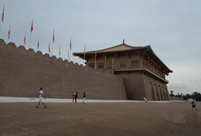 In pics: YOG prism
In pics: YOG prism
 Amputee girl reaches top of half-left tower in Jiangxi
Amputee girl reaches top of half-left tower in Jiangxi
 Yardangs in Lop Nur
Yardangs in Lop Nur
 Intoxicating Ayding Lake in Xinjiang
Intoxicating Ayding Lake in Xinjiang
 Beijing's MJ impersonator a 'thriller' for crowds
Beijing's MJ impersonator a 'thriller' for crowds
 Armed police compete on the plateau
Armed police compete on the plateau
 Rubber Duck settles in Guiyang new urban area
Rubber Duck settles in Guiyang new urban area
 Rare set of giant panda triplets turn one month old
Rare set of giant panda triplets turn one month old
 Closing ceremony of Youth Olympic Games
Closing ceremony of Youth Olympic Games
 Attractive posters to welcome freshmen
Attractive posters to welcome freshmen
During his ongoing state visit to Japan, Indian Prime Minister Narendra Modi made some remarks on Monday that could easily be highlighted and hyped up by media outlets. As an example, he said that Japan and India should strengthen strategic cooperation to promote peace and prosperity in Asia and meanwhile counter an expansionist mind-set.
"Everywhere around us, we see an 18th century expansionist mind-set: encroaching on another country, intruding in others' waters, invading other countries and capturing territory," Modi said in a speech to business leaders in Tokyo.
Japanese and Western public opinion views his remarks as a clear reference to China, although he did not mention China by name.
This interpretation made some sense because Modi is more intimate to Tokyo emotionally. Therefore it is perhaps a fact that he embraces some nationalist sentiments against China.
But the rationality, policy and strategy of a big country are shaped by its national interests. As a defender of India's national interests, Modi is predicted to make some remarks suitable for media hype, but he has avoided naming China directly.
China's GDP is five times that of India's. Mutual trust between Beijing and New Delhi, facing strategic pressure from the north, is difficult to build as there is also an unresolved border conflict between the two.
But India has proved it is a rational country, displaying an independent foreign policy and loathing being an appendix of any particular power. Plus, India cherishes peace. The consensus between China and India has become stronger over not letting border issues shadow a bilateral relationship. The positive India-China relationship has also created conditions for rapport between India and Pakistan.
The increasing intimacy between Tokyo and New Delhi will bring at most psychological comfort to the two countries. What is involved in China-India relations denotes much more than the display of the blossoming personal friendship between Modi and Abe. After all, Japan is located far from India. Abe's harangue on the Indo-Pacific concept makes Indians comfortable. It is South Asia where New Delhi has to make its presence felt. However, China is a neighbor it can't move away from. Sino-Indian ties can in no way be counterbalanced by the Japan-India friendship.
Both as new emerging countries and members of BRICS, China and India have plenty of interests in common. Geopolitical competition is not the most important thing for the two countries, at least at present.
China-India relations are stable. Chinese President Xi Jinpingwill pay a state visit to India later this month and the only country Chinese leaders won't visit in the near future is Japan. If Japan attempts to form a united front centered on India, it will be a crazy fantasy generated by Tokyo's anxiety of facing a rising Beijing.
 Models with two-dimensional codes painted on bodies
Models with two-dimensional codes painted on bodies Antique exhibition of Maritime Silk Road held in Jinan
Antique exhibition of Maritime Silk Road held in Jinan NASA releases images of solar flare
NASA releases images of solar flare Daming Palace in Chang’an City in photos
Daming Palace in Chang’an City in photos Babies of celebrities born in the year of horse
Babies of celebrities born in the year of horse Farmer Painting, one of Ansai's Three Strange Wonders
Farmer Painting, one of Ansai's Three Strange Wonders Special holidays
Special holidays World's top 10 fighters
World's top 10 fighters 'Stewardesses' serve in hospital
'Stewardesses' serve in hospital Capital Spirits: the capital's first liquor bar
Capital Spirits: the capital's first liquor bar 2014 int’l drone exhibition
2014 int’l drone exhibition Chengdu International Auto Show
Chengdu International Auto Show Trainings taken by Chinese navy divers
Trainings taken by Chinese navy divers Anti-terrorism electric patrol car
Anti-terrorism electric patrol car Female PLA honor guards
Female PLA honor guardsDay|Week|Month